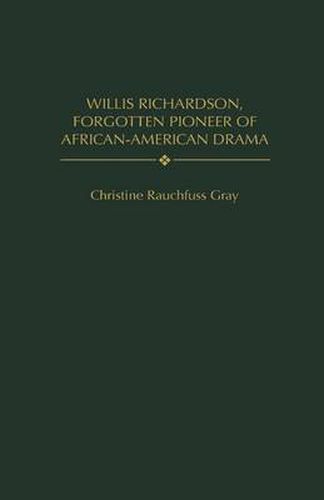Readings Newsletter
Become a Readings Member to make your shopping experience even easier.
Sign in or sign up for free!
You’re not far away from qualifying for FREE standard shipping within Australia
You’ve qualified for FREE standard shipping within Australia
The cart is loading…






During the 1920s and 1930s, Willis Richardson (1889-1977) was highly respected as a leading African-American playwright and drama anthologist. His plays were performed by numerous black high school, college, and university drama groups and by theater companies in Chicago, New York, Washington D.C., Cleveland, Baltimore, and Atlanta. With the opening of The Chip Woman’s Fortune (1923), he became the first African American to have a play produced on Broadway. Several of his 46 plays were published in assorted magazines, and in his essays, he urged black Americans to seek their dramatic material in their own lives and circumstances. In addition, he edited three anthologies of plays by African-Americans. But between 1940 and his death in 1977, Richardson came to realize that his plays were period pieces and that they no longer reflected the problems and situations of African-Americans. In the years before his death, he attempted vigorously yet unsuccessfully to preserve several of his plays through publication, if not production. But the man who has been called the father of African-American drama and who was considered the hope and promise of African-American drama died in obscurity.
Richardson has even been neglected by the scholarly community. This critical biography, the first extensive consideration of his life and work, firmly reestablishes his pioneering role in American theater. The book begins with a detailed chronology, followed by a thoughtful biographical essay. The volume then examines the nature of African-American drama in the 1920s, the period during which Richardson was most productive, and it analyzes his approach to drama as a means of educating African-American audiences. It then explores the African-American community as the central theme in Richardson’s plays, for Richardson typically looks at the consequences of refusals by blacks to help one another. The work additionally considers Richardson’s history plays, his anthologies, his dramas intended for black children, and his essays. A concluding chapter summarizes his lasting influence; the book closes with a listing of his plays and an extensive bibliography.
$9.00 standard shipping within Australia
FREE standard shipping within Australia for orders over $100.00
Express & International shipping calculated at checkout
During the 1920s and 1930s, Willis Richardson (1889-1977) was highly respected as a leading African-American playwright and drama anthologist. His plays were performed by numerous black high school, college, and university drama groups and by theater companies in Chicago, New York, Washington D.C., Cleveland, Baltimore, and Atlanta. With the opening of The Chip Woman’s Fortune (1923), he became the first African American to have a play produced on Broadway. Several of his 46 plays were published in assorted magazines, and in his essays, he urged black Americans to seek their dramatic material in their own lives and circumstances. In addition, he edited three anthologies of plays by African-Americans. But between 1940 and his death in 1977, Richardson came to realize that his plays were period pieces and that they no longer reflected the problems and situations of African-Americans. In the years before his death, he attempted vigorously yet unsuccessfully to preserve several of his plays through publication, if not production. But the man who has been called the father of African-American drama and who was considered the hope and promise of African-American drama died in obscurity.
Richardson has even been neglected by the scholarly community. This critical biography, the first extensive consideration of his life and work, firmly reestablishes his pioneering role in American theater. The book begins with a detailed chronology, followed by a thoughtful biographical essay. The volume then examines the nature of African-American drama in the 1920s, the period during which Richardson was most productive, and it analyzes his approach to drama as a means of educating African-American audiences. It then explores the African-American community as the central theme in Richardson’s plays, for Richardson typically looks at the consequences of refusals by blacks to help one another. The work additionally considers Richardson’s history plays, his anthologies, his dramas intended for black children, and his essays. A concluding chapter summarizes his lasting influence; the book closes with a listing of his plays and an extensive bibliography.